A Customer Relationship Management (CRM) interface can be on various cloud platforms, such as Salesforce and Microsoft Azure. These platforms offer diverse features for effective customer management.
Customer Relationship Management (CRM) interfaces on cloud platforms play a critical role in streamlining business processes and improving customer interactions. Leading CRM platforms like Salesforce are widely recognized for their robust CRM solutions and intuitive user interface. Another powerful CRM solution is Microsoft Azure, which provides seamless integration with various Microsoft services.
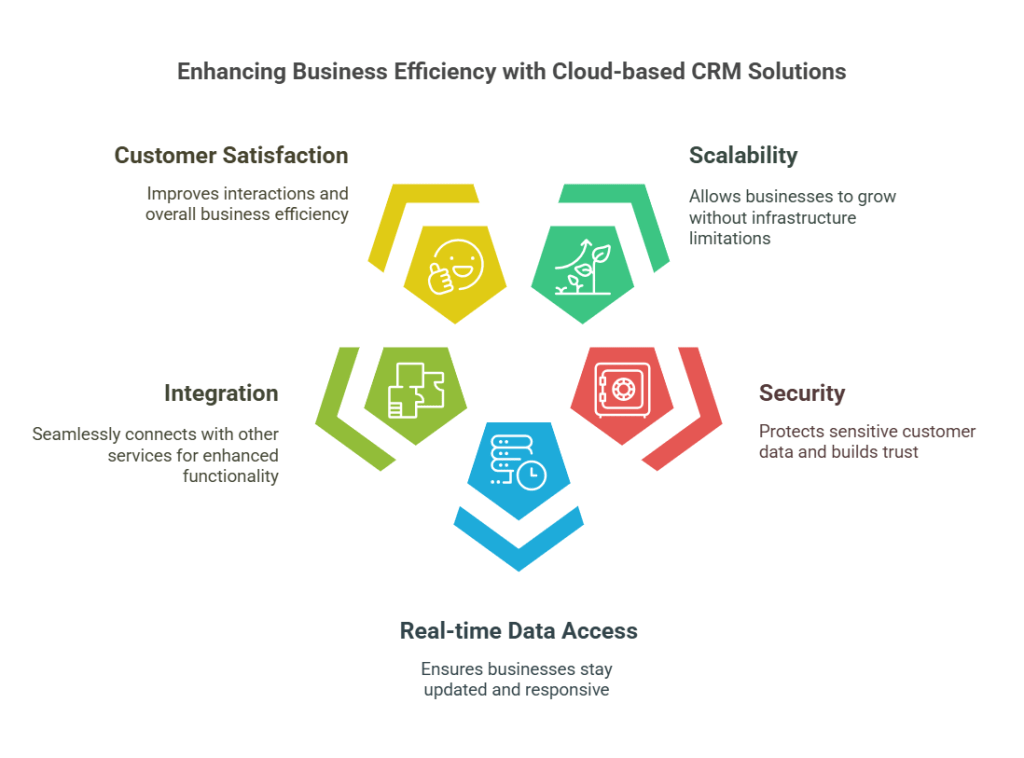
Cloud-based CRM systems offer real-time data access, allowing businesses to stay updated and responsive to customer needs. These platforms also support scalability, ensuring businesses can expand their CRM capabilities as they grow. By leveraging cloud CRM systems, companies can improve their customer relationship management, drive efficiency, and deliver a more personalized experience to their clients.
Table of Contents
ToggleIntroduction To Crm Interfaces
Customer Relationship Management (CRM) interfaces have transformed how businesses operate. These interfaces help manage interactions with customers. They streamline workflows and improve customer satisfaction. By using CRM systems, businesses can better understand customer needs.
Evolution Of Crm
CRM systems have evolved significantly. Initially, they were simple databases. Businesses used them to store customer information. Over time, CRM systems became more complex. They started offering advanced features like analytics and automation.
Today, CRM interfaces are highly sophisticated. They integrate with various business tools. This integration enhances their functionality. Modern CRM systems offer cloud-based solutions. These solutions provide flexibility and scalability.
Importance Of Crm Interfaces
CRM interfaces are crucial for businesses. They help manage customer data efficiently. A good CRM interface can improve customer relationships. It can also boost sales and customer retention.
Key benefits of CRM interfaces include:
- Centralized customer information
- Improved communication with customers
- Enhanced customer service
- Automated workflows
- Better data analysis
| Feature | Description |
|---|---|
| Centralized Information | Stores all customer data in one place. |
| Communication | Improves interactions with customers. |
| Customer Service | Enhances service through better data access. |
| Automated Workflows | Streamlines business processes. |
| Data Analysis | Provides insights for better decision-making. |
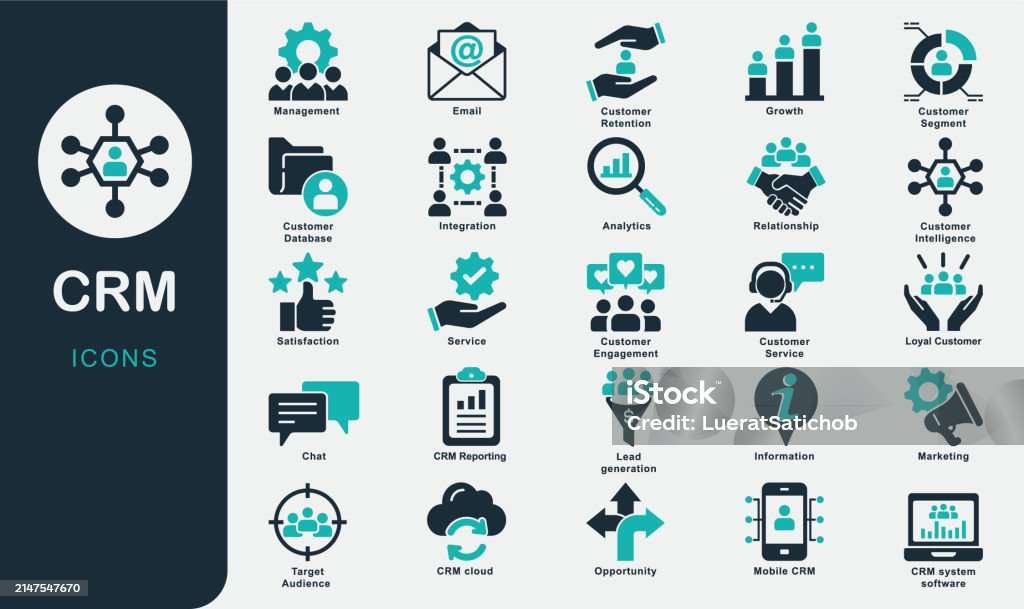
The Benefits of CRM
From my experience, I have found that implementing CRM systems has a transformative impact on a business. Here’s how:
- Improved Customer Retention: CRM systems enable businesses to keep track of every customer interaction, making it easier to resolve issues and keep customers satisfied.
- Personalized Marketing: By analyzing customer data, CRM platforms allow businesses to tailor marketing efforts to individual customer preferences.
- Better Communication: CRM systems enhance internal collaboration by giving teams access to the same customer data, improving response times and customer service.
Public Cloud Crm
Public Cloud CRM solutions offer businesses flexible and scalable options. These solutions run on shared cloud infrastructure. This makes them cost-effective and easy to deploy. Small to large businesses can benefit from using a Public Cloud CRM.
Benefits Of Public Cloud
- Cost-Efficiency: Pay only for what you use.
- Scalability: Easily scale resources up or down.
- Accessibility: Access data from anywhere, anytime.
- Maintenance-Free: Providers handle all updates and maintenance.
- Security: Robust security measures to protect data.
Top Public Cloud Providers
| Provider | Key Features |
|---|---|
| Amazon Web Services (AWS) |
|
| Microsoft Azure |
|
| Google Cloud Platform (GCP) |
|
Private Cloud Crm
A Private Cloud CRM offers personalized and secure customer relationship management. Companies use their own servers or dedicated resources. This ensures better data privacy and control.
Advantages Of Private Cloud
- Enhanced Security: Private Clouds offer top-notch security. Only authorized users can access the data.
- Customization: Tailor the CRM to meet specific business needs. Adapt the system as required.
- Better Performance: Dedicated resources ensure optimal performance. No sharing with other users.
- Regulatory Compliance: Meet industry regulations easily. Keep data within specific geographic regions.
- Scalability: Scale resources based on demand. Grow your business without hassle.
Examples Of Private Cloud Solutions
| Solution | Description | Features |
|---|---|---|
| Microsoft Dynamics 365 | Highly customizable CRM solution. |
|
| Salesforce Private Cloud | Offers robust CRM functionalities. |
|
| Oracle CRM | Enterprise-level CRM solution. |
|
Hybrid Cloud Crm
Customer Relationship Management (CRM) systems are evolving rapidly. One popular option is the Hybrid Cloud CRM. This solution combines the benefits of both public and private clouds. It offers flexibility, scalability, and enhanced data security.
Why Choose Hybrid Cloud?
Choosing a Hybrid Cloud for your CRM offers multiple benefits. These include:
- Flexibility: Easily switch between public and private clouds.
- Scalability: Scale resources based on your business needs.
- Data Security: Keep sensitive data in a private cloud.
- Cost-Effective: Optimize costs by using public clouds for less sensitive data.
Popular Hybrid Cloud Platforms
| Platform | Features |
|---|---|
| Microsoft Azure |
|
| Google Cloud |
|
| Amazon Web Services (AWS) |
|
Each platform offers unique features. Choose one that best fits your needs. Microsoft Azure is ideal for businesses using Microsoft tools. Google Cloud excels in AI and data analytics. AWS provides a broad range of services and strong reliability.
Research-backed Insights on Cloud CRM Performance
According to a 2019 Gartner Research report businesses that adopt cloud-based CRM systems have seen a 35% improvement in customer retention rates. The research indicates that cloud CRMs not only streamline operations but also allow businesses to offer more personalized experiences to customers.
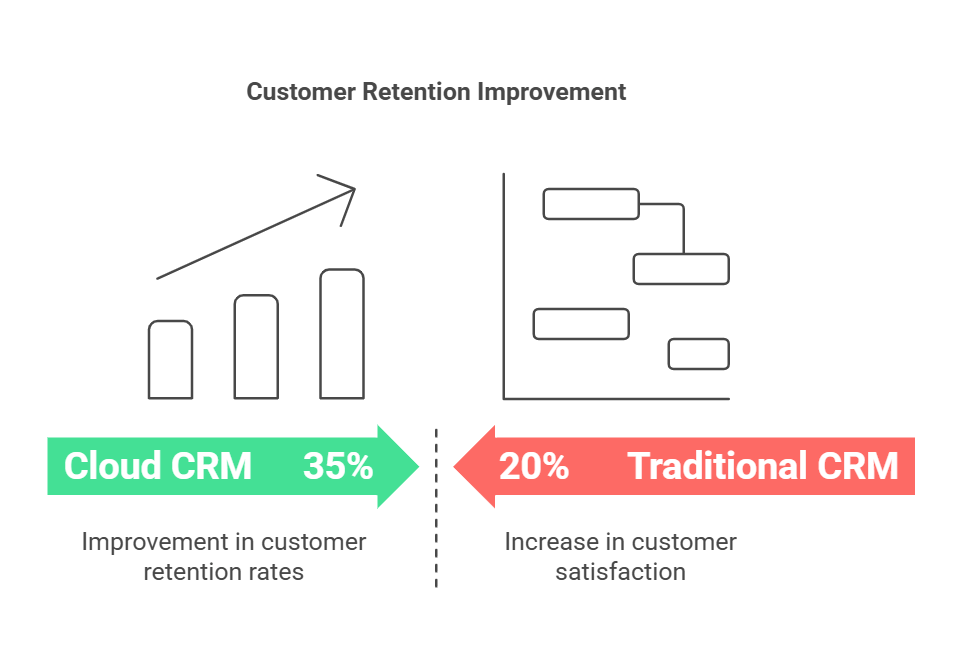
Another study from Forrester Research (2020), titled “Cloud-Based CRM: A Strategic Imperative,” shows that cloud CRM adoption is correlated with a 20% increase in customer satisfaction due to the improved data accessibility and service quality it offers.
Multi-cloud Crm
Multi-Cloud CRM uses multiple cloud services for managing customer relationships. It helps businesses avoid dependency on a single cloud provider. Multi-Cloud CRM offers better redundancy, flexibility, and performance.
Flexibility Of Multi-cloud
Multi-Cloud CRM solutions provide unmatched flexibility. Businesses can mix and match cloud services to fit their needs.
Using multiple clouds, companies can:
- Optimize costs by choosing cost-effective services.
- Avoid vendor lock-in and keep control over their data.
- Improve performance by leveraging the strengths of different clouds.
This flexibility enables better resource allocation and risk management. It ensures that businesses stay agile and competitive.
Strategies For Multi-cloud Adoption
Adopting a Multi-Cloud CRM strategy requires careful planning. Here are key strategies to consider:
- Assessment: Evaluate current infrastructure and needs.
- Cloud Selection: Choose clouds based on strengths and costs.
- Integration: Ensure seamless integration between different cloud services.
- Security: Implement robust security measures across all clouds.
- Monitoring: Continuously monitor performance and costs.
Proper planning and execution can lead to a successful Multi-Cloud CRM strategy. This ensures your business reaps the benefits of flexibility and efficiency.
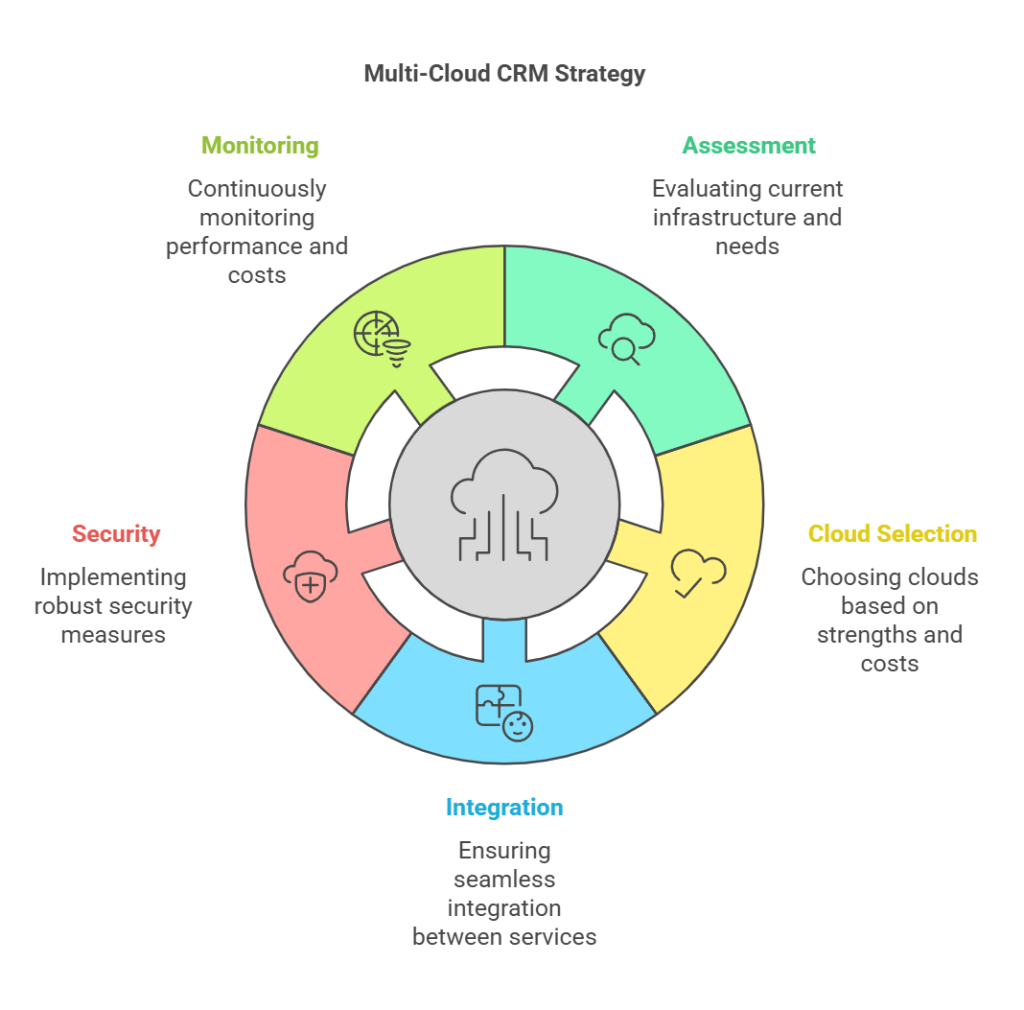
Security Considerations
Choosing the right cloud for your Customer Relationship Management (CRM) interface is crucial. Security considerations play a significant role in this choice. Ensuring that your data is safe and compliant with regulations is vital.
Data Protection
Data Protection is the foundation of any secure CRM interface. Your chosen cloud service must offer robust encryption. Both in transit and at rest, data must be encrypted. This ensures unauthorized users cannot access sensitive information.
Look for cloud providers that offer advanced security features. These include multi-factor authentication and intrusion detection systems. Such features add layers of security to your CRM interface.
Compliance Requirements
Compliance Requirements are legal and regulatory standards you must follow. Different industries have specific compliance needs. For instance, healthcare organizations must comply with HIPAA. Financial institutions need to adhere to PCI DSS.
Choose a cloud provider that meets these compliance standards. Verify that they regularly update their compliance certifications. This ensures your CRM interface stays within legal boundaries.
| Industry | Compliance Standard |
|---|---|
| Healthcare | HIPAA |
| Finance | PCI DSS |
| General Data | GDPR |
Cost Implications
Understanding the cost implications of a Customer Relationship Management (CRM) interface on different clouds is crucial. Cloud services can vary significantly in their pricing models, and selecting the right one can save your business money.
Comparing Cloud Costs
Different cloud providers offer unique pricing structures. Here’s a comparison of the most popular options:
| Cloud Provider | Cost Structure | Key Features |
|---|---|---|
| AWS | Pay-as-you-go | Scalability, Extensive Services |
| Microsoft Azure | Subscription-based | Integration with Microsoft Products |
| Google Cloud | Custom Pricing | AI and Machine Learning |
Cost-saving Tips
Here are some tips to save costs when choosing a cloud provider for your CRM:
- Choose the right plan: Select a plan that fits your business needs.
- Monitor usage: Regularly monitor usage to avoid unnecessary expenses.
- Leverage discounts: Take advantage of discounts for long-term commitments.
- Optimize resources: Use tools to optimize cloud resource usage.
Future Trends
The future of Customer Relationship Management (CRM) on the cloud is bright. New technologies are revolutionizing how businesses manage customer relationships. Two major trends are reshaping CRM: AI and IoT integration.
Ai In Crm
Artificial Intelligence (AI) is transforming CRM. AI helps automate tasks and provides valuable insights. Machine learning algorithms predict customer behavior. This allows businesses to offer personalized experiences.
AI chatbots enhance customer service. They respond to queries instantly and improve customer satisfaction. AI also assists in lead scoring, identifying high-potential leads.
- Automated tasks save time
- Predictive insights drive sales
- Chatbots enhance support
- Lead scoring optimizes marketing
Integration With Iot
The Internet of Things (IoT) connects devices and collects data. Integrating IoT with CRM offers new opportunities. Businesses can monitor product usage in real-time. This data helps in understanding customer needs better.
IoT-enabled CRMs notify businesses about maintenance needs. This proactive approach improves customer satisfaction. Companies can offer timely support and ensure product uptime.
| Benefits of IoT in CRM |
|---|
| Real-time product monitoring |
| Proactive maintenance alerts |
| Enhanced customer support |

Tips for Choosing the Right Cloud CRM
Here are some practical tips based on my personal experience:
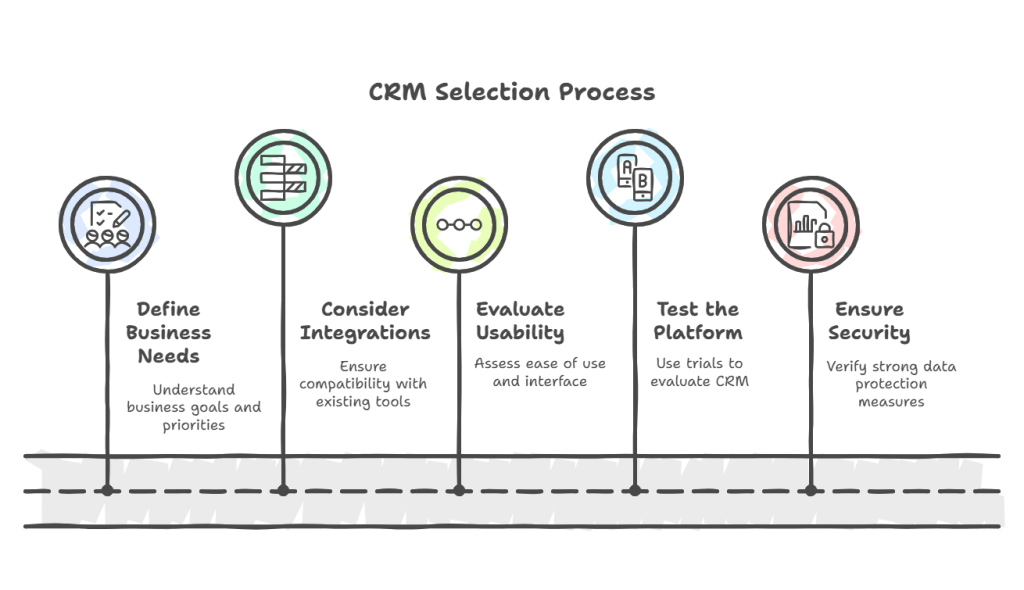
- Define Your Needs First: Understand your business goals, customer base, and pain points before choosing a CRM. This will help you prioritize the features you need (e.g., sales automation, reporting, or integration with other tools).
- Consider Integrations: Choose a CRM that integrates well with the tools you already use, such as email marketing platforms, social media tools, or e-commerce platforms.
- Evaluate Usability: A CRM system should be easy to use. Avoid platforms that require extensive training. A user-friendly interface will save you time and money in the long run.
- Test the Platform: Most CRM providers offer free trials or demo versions. Make sure to test the platform with real-world data before committing.
- Security: Choose a CRM with strong data protection and encryption to ensure your customer data remains safe.
Challenges and How to Overcome Them
While cloud CRMs offer many benefits, there are challenges, such as:
- Data Migration: Moving your existing customer data to a cloud CRM can be time-consuming. To overcome this, work with the CRM provider to develop a migration plan.
- Training and Adoption: Ensure your team is well-trained to use the new CRM system. Consider onboarding programs and ongoing training.
- Data Security: Since your data is stored on the cloud, ensure that the provider follows industry-standard security protocols and offers data encryption.
Frequently Asked Questions
What Cloud Platforms Support Crm Interfaces?
CRM interfaces can be hosted on several cloud platforms, including AWS, Microsoft Azure, and Google Cloud. These platforms offer scalable and secure environments for CRM systems.
Can Crm Be Deployed On A Private Cloud?
Yes, CRM systems can be deployed on private clouds. This option offers enhanced security and control over data. It is ideal for businesses with specific regulatory requirements.
Is Cloud-based Crm Secure?
Cloud-based CRM systems are secure. Reputable cloud providers implement robust security measures like encryption and regular security audits. This ensures data protection and compliance.
Does Cloud Crm Offer Scalability?
Yes, cloud-based CRM solutions are highly scalable. They can easily accommodate growing data and user numbers. This makes them suitable for businesses of all sizes.
Conclusion
choosing the right cloud CRM is a critical decision for any business looking to enhance customer relationships and operational efficiency. Consider your business size, needs, and budget when selecting a cloud CRM platform. Salesforce, HubSpot, Microsoft Dynamics, and Zoho CRM all offer different benefits, so the right choice depends on your unique situation.
By implementing a cloud CRM, you can not only streamline your operations but also deliver superior customer experiences that drive growth and satisfaction.
